So, What Is Herpes, Really?

You know what? Most people have heard of herpes, but honestly, not everyone really knows what it is. Let me explain: herpes is caused by the herpes simplex virus (HSV), and it’s far more common than most people think. Seriously, it doesn’t matter if you’re young, old, single, or married—herpes can affect anyone.
There are two main types: HSV-1 and HSV-2. HSV-1 usually shows up as cold sores or fever blisters around the mouth, while HSV-2 typically affects the genital area. But here’s the twist: HSV-1 can also appear in the genital region if transmitted via oral sex. Confusing, right? Yeah, a little. But that’s why knowing what is herpes matters—you can’t manage what you don’t understand.
Honestly, think of HSV like a little uninvited guest in your body. Sometimes it stays quiet, just chilling in the background. Other times, it shows up unannounced, like that friend who pops by right when you’re in the middle of a Zoom call, totally unprepared. And honestly, the unpredictability is one of the things that freaks people out the most. You never really know when it’ll appear, but you can learn to spot the signs.
HSV-1 vs HSV-2: The Siblings of Viruses

Here’s the thing: HSV-1 and HSV-2 are basically siblings, but they behave differently. HSV-1 is like the older, laid-back sibling—mostly sticking to the mouth, showing up occasionally, and not making a huge fuss. HSV-2, on the other hand, is more active and tends to flare up in the genital area more often.
Have you noticed how the body sometimes reacts to stress in the weirdest ways? That’s exactly how HSV works. Stress, illness, even lack of sleep can trigger outbreaks. It’s like your nerves are hosting a little gossip session, and HSV gets wind of it and decides to make an appearance. Not fair, right? But knowing this helps you anticipate and manage outbreaks better. You’re not powerless—you’re just learning the language of your body.
Here’s a small digression: some researchers say HSV-1 is actually more common than HSV-2, which surprises people. You’d think genital herpes would be the most talked-about—but no, oral herpes quietly sneaks around, affecting millions without most people even realizing it. That’s another reason understanding herpes 1 vs herpes 2 is crucial—you can’t fight what you don’t know.
How Do People Even Get Herpes?

You might be asking yourself, “Wait, how do you contract herpes anyway?” Honestly, it’s simpler than most people think, but it can also be sneaky. HSV spreads through direct skin-to-skin contact, often during kissing, oral sex, or genital contact.
And here’s the kicker: you don’t always see it coming. Many people can transmit the virus even without visible sores. That’s called asymptomatic shedding. It’s a bit like a silent email you didn’t know you were cc’d on—completely invisible, but it’s still there. So yeah, herpes is a bit sneaky, but it’s not some doom sentence. Millions of people live with HSV without it ever derailing their lives.
Honestly, there are even cases where people get HSV from the most surprising places—like sharing lip balm or a drinking glass. Not super common, but it happens. That’s why knowing how do you contract herpes matters so much—it’s not always obvious, but awareness makes a big difference.
Symptoms: What Should You Watch For?

Not everyone gets symptoms, which honestly makes herpes kind of tricky. But when outbreaks happen, you’ll usually notice tingling, itching, or a burning sensation first. Then, tiny blisters appear, which can be painful.
Let me tell you—your first outbreak can be nerve-wracking. You see these blisters and think, “Oh no, what’s happening to me?” Some people even get flu-like symptoms: fever, fatigue, swollen lymph nodes. The good news? Later outbreaks are usually milder. And once you get used to noticing those early signs, it becomes easier to manage. It’s not just about reacting—it’s about anticipating.
Here’s an analogy: think of herpes symptoms like traffic signals. A red light might be your first tingle or itch—warning you that HSV is on the move. If you respond quickly with medication or care, you can prevent the “accident,” which is the full outbreak. Over time, you become good at reading these signals, and life feels a little more predictable.
Herpes Treatment: Yes, There’s Hope

Here’s the thing: even though there’s no cure for herpes, treatments today make it manageable. Antiviral medications like acyclovir, valacyclovir, and famciclovir can reduce outbreak severity, shorten duration, and lower the risk of passing HSV to someone else.
Some people take medication only during outbreaks, while others use daily suppressive therapy. You know what? Daily therapy might feel like a lot at first, but it can make life almost feel normal again. Pair that with healthy habits—sleep, stress management, balanced nutrition—and many people find HSV barely interferes with daily life. It’s not just about the meds—it’s about the lifestyle.
Honestly, it’s amazing how something as simple as a good night’s sleep can keep HSV in check. Sleep, diet, and stress management might not seem like “treatment,” but they’re powerful tools for reducing outbreaks.
Read our blog Herbal Treatments for Herpes: Fact, Fiction, and Hope to learn about remedies used : https://evaluatemymeds.com/index.php/2025/08/14/herpes-herbal-treatments-for-symptom-relief .
Living With Herpes: The Emotional Side

Honestly, this part often hits harder than the physical symptoms. Stigma can be heavy. People hide their diagnosis out of fear—fear of judgment, rejection, or even being labeled “unclean.” And that fear? It’s exhausting.
But here’s the good news: you are not alone. Millions of people live full, happy lives with HSV. It doesn’t define you. Relationships, careers, hobbies—they’re all still possible. In fact, you might even find that being upfront about herpes actually strengthens trust with a partner. Yeah, it sounds counterintuitive, but honesty builds connection.
You know, fear of judgment is powerful. It makes people overly secretive. But when you talk openly, you take that power away. You’re not hiding; you’re owning your story.
Herpes Myths vs. Facts

Let’s clear up some myths that honestly shouldn’t even exist:
-
Myth: Only promiscuous people get herpes.
Fact: Nope. HSV is extremely common. Anyone can get it, even in committed relationships. -
Myth: You can always tell if someone has herpes.
Fact: Many people don’t show symptoms. The virus can be silent. -
Myth: Herpes ruins relationships.
Fact: With honesty, precautions, and treatment, people with HSV have healthy, loving relationships. -
Myth: Herpes is rare.
Fact: One in six adults in the U.S. has genital herpes. You probably know someone with it already.
Honestly, it’s wild how these myths persist when the facts are so clear.
Prevention: Protecting Yourself and Others

Let’s be real. Talking about prevention can feel awkward, but it’s just part of taking care of yourself. Using condoms, being honest with partners, and avoiding sexual activity during outbreaks greatly reduce the risk of transmission. Daily antiviral therapy adds another layer of protection.
Here’s a casual analogy: think of herpes like a little mischievous cat in your house. You can’t lock it away forever, but you can manage its mischief—close the windows, put food away, and make sure it doesn’t get into places it shouldn’t. Prevention is just managing the virus responsibly, not living in fear.
Herpes and Relationships
Dating with herpes can feel like navigating a minefield, honestly. You worry about the “what if” moments: What if I have to tell someone? What if they react badly?
You know what? Most people respond better than you expect when you’re honest. Sharing the facts instead of just fear helps normalize it. Some people even find that talking about herpes brings them closer to their partner—trust and intimacy can deepen when vulnerability is handled with care.
Honestly, it’s a little funny sometimes—people imagine a “rejection drama,” but often, the other person just appreciates the honesty.
Talking About Herpes Matters

You know why this is so important? Silence fuels stigma. Every time someone whispers about herpes instead of saying it out loud, the shame grows. Open, honest conversations break that cycle.
Even small actions help—like sharing factual articles, checking the CDC website, or joining a support group. Knowledge isn’t just power; it’s freedom from unnecessary shame. And honestly, once you start talking about it, you realize it’s not as scary as everyone makes it seem.
Conclusion: Herpes Is Just a Virus
Here’s the takeaway: herpes is common, manageable, and not a reflection of your worth. You’re not defined by HSV. With treatment, awareness, and honesty, you can live fully and confidently.
Think of it like this: herpes is a little rain cloud. It’s there, sometimes drops a few raindrops on your plans, but it doesn’t stop you from enjoying the sun. You notice it, manage it, and move on.
Millions of people live with HSV every day. And you know what? So can you—confidently, healthily, and without letting stigma dictate your story.
❓ Frequently Asked Questions (FAQ) About Herpes
1. Can herpes go away on its own?
No, herpes doesn’t completely go away. The virus stays in your body for life. However, outbreaks can be managed with antiviral medication and lifestyle habits. If you’re on other medications and worried about interactions, you can always check at www.evaluatemymeds.com.
2. How do I know if I have herpes?
Some people don’t notice symptoms at all, while others get blisters, itching, or burning. The only sure way to know is by getting tested by a healthcare professional.
3. Can I still have a normal relationship ?
Yes! Millions of people with herpes are in healthy, loving relationships. The key is communication, honesty, and using protection to lower the chance of passing it to your partner.
4. Does stress really trigger herpes outbreaks?
Yes, stress can weaken your immune system, making outbreaks more likely. Think of it like your body being “tired” and giving the virus an opportunity to flare up. Relaxation, good sleep, and exercise can help keep symptoms at bay.
5. Can I take my regular medications with herpes antivirals?
In most cases, yes, but some medicines may interact. Always double-check. Tools like www.evaluatemymeds.com can help you see if your meds are safe together.
6. Is there a cure ?
Right now, there’s no cure. But treatments can reduce outbreaks, shorten healing time, and make symptoms less severe. Research is ongoing, so never lose hope.
7. Will herpes affect my overall health long-term?
For most healthy adults, herpes is more of an inconvenience than a serious threat. But it can be riskier for newborns or people with very weak immune systems, which is why medical guidance is so important.
🌍 External Link Suggestions (Authoritative Sources):
-
CDC – Simplex Virus (HSV) Factsheet
👉 https://www.cdc.gov/std/herpes/stdfact-herpes.htm -
Mayo Clinic – Genital Overview
👉 https://www.mayoclinic.org/diseases-conditions/genital-herpes -
World Health Organization (WHO) – Herpes Simplex Virus
👉 https://www.who.int/news-room/fact-sheets/detail/herpes-simplex-virus -
Johns Hopkins Medicine – Living with Herpes
👉 https://www.hopkinsmedicine.org/health/conditions-and-diseases/herpes -
American Sexual Health Association (ASHA) – Resource Center
👉 https://www.ashasexualhealth.org/stdsstis/herpes/
🔗 Internal Link Suggestions:
-
Medication Interactions → Link to a page like: http://www.evaluatemymeds.com/medication-interactions
-
Simplified Medical Reports → Link to: www.evaluatemymeds.com/simplified-medical-documents








